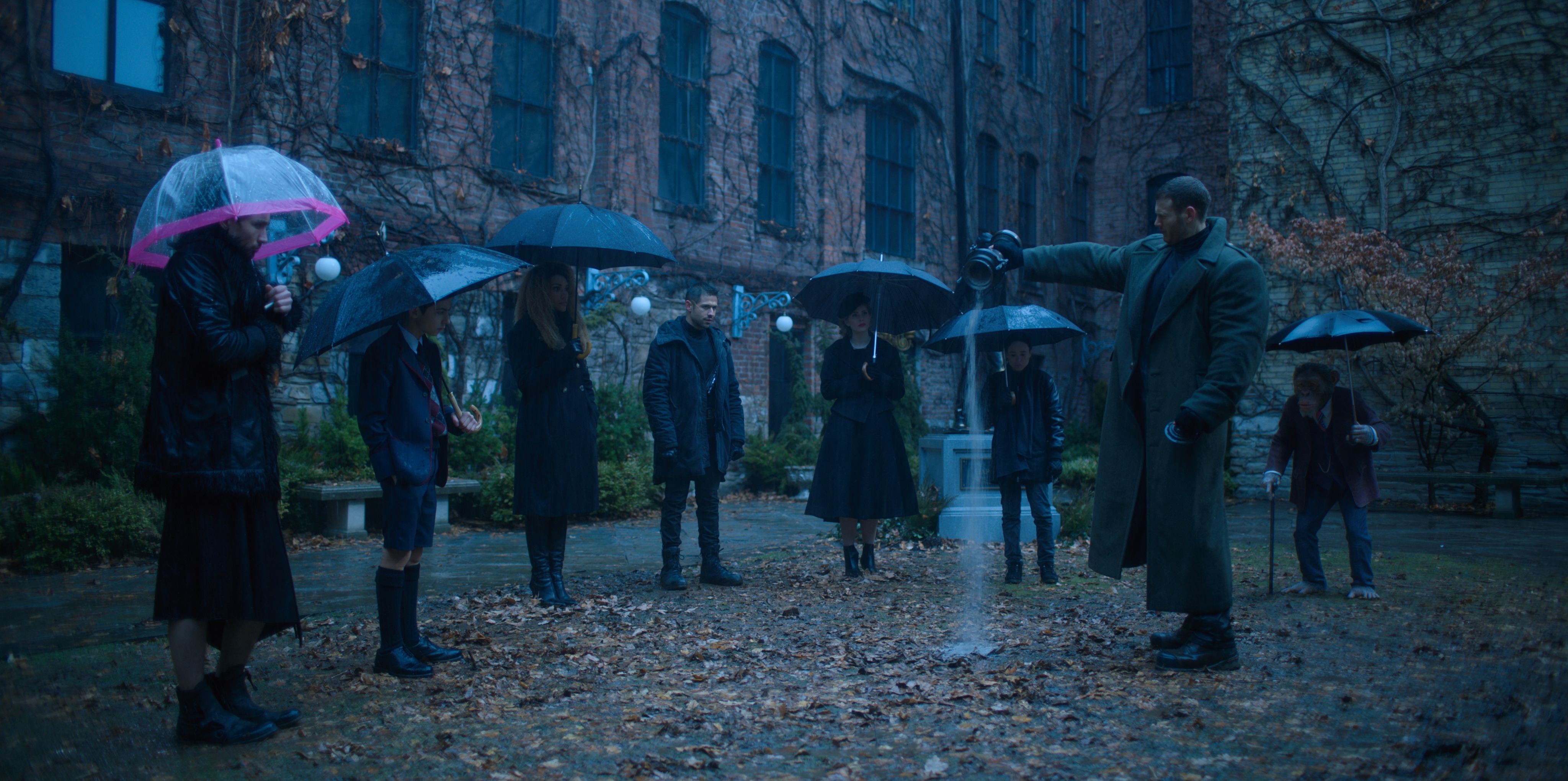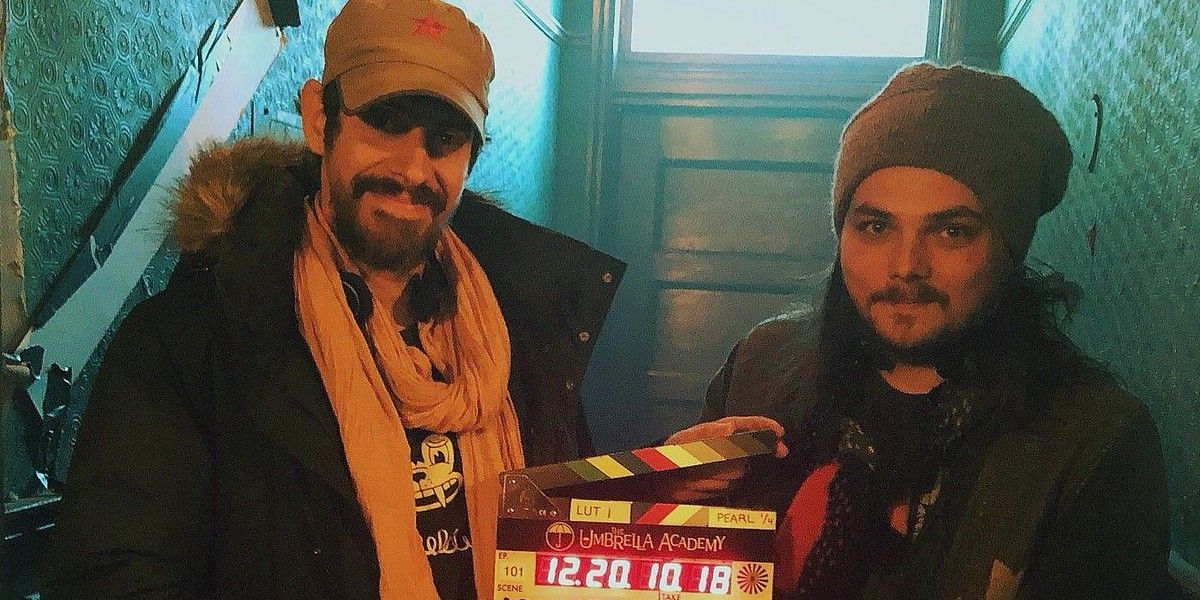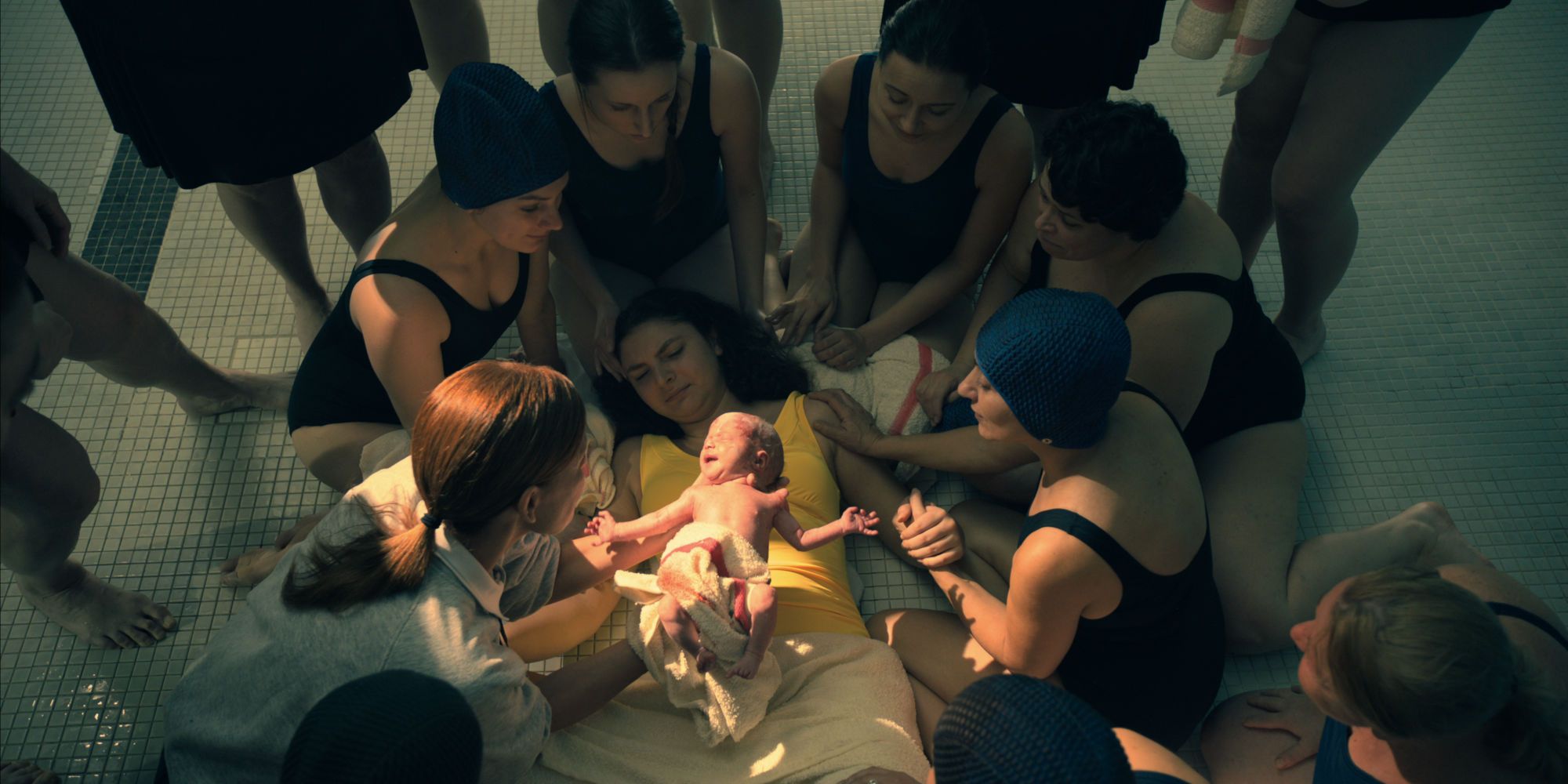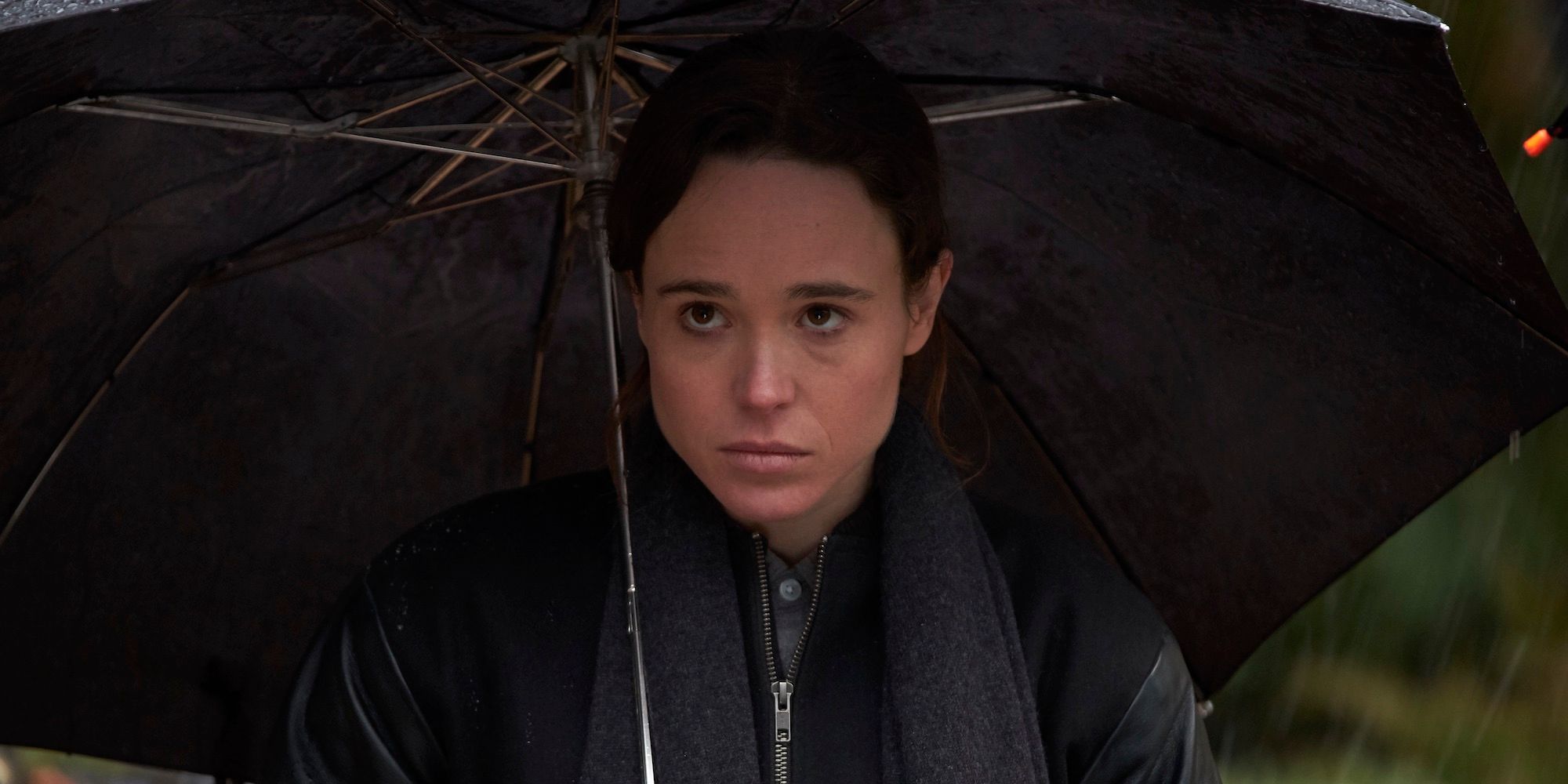Gerard Way is an internationally known singer, songwriter, and musician who was the lead vocalist and co-founder of the rock band My Chemical Romance. In 2007, he wrote the offbeat superhero comic book The Umbrella Academy, which is now an upcoming Netflix series. Steve Blackman has been an executive producer on Legion, Fargo, and Altered Carbon. He was also the co-showrunner on ABC’s medical-drama Private Practice. Now he’s the showrunner for Netflix’s The Umbrella Academy.
Screen Rant: Pleasure to meet you guys. Amazing job on the show. I've read the first graphic novel and I was like, ‘How is this going to come to life?’ And it is amazing. So, first question is, what was the decision for making the shows present in 1989, not the 70’s.
Steve Blackman: You mean in terms of-- The show is set in the sort of now-present. Was it in the graphic novel that 1989 was the year, right? That was always the year?
Gerard Way: No, there was no year in the comic.
Steve Blackman: Oh, we set a year.
Gerard Way: You guys set a year. You needed to.
Steve Blackman: We needed to because we wanted to make it in our present. So you're near present. So that's why we said 1989.
Screen Rant: Gotcha. Both you, Gerard, and Gabriel, you guys had a hand in producing the series, which is extremely rare, if not kind of groundbreaking, to have both writers and illustrators of the comic series get to actually produce and help adapt their own project. How has that impacted the production?
Gerard Way: Well the first thing is Steve is really respectful of the source material. So there's already a really solid relationship there. And Gabriel and I being executive producers, what that allows is for us to give really good notes when we want to or when we feel that there's time for notes, we give notes. And ultimately, it’s Steve's call. But he listens to us and he looks at all the notes. And so, I think that we were just kind of helping solve problems or keep it on tone. I'm trying to think of how our notes kind of--
Steve Blackman: They helped. I mean, look, the truth is we wanted to collaborate. I always wanted to collaborate with Gerard and gave all respect to what they did. And it was really nice because I have been in situations where you are completely cut off and I don’t know how that helps. It's great to say to them, ‘Hey, Gerard, why did you guys do this? Why don't you do that?’ But also, when they were on set. And they came to visit sets and for them to sort of see and say, ‘Is that what you imagined? Is this close?’ And not everything can match, not everything translates. But I always felt these guys had my back. I could call them. They reached out. We always had a good exchange of emails and ideas. And look, we had like Gabriel's drawings hidden in the set for lots of Easter eggs. I mean, that's when your collaborative with these guys. A lot of that fun you get, you know, get to. So, it's been great working with them.
Screen Rant: Let me ask you about, what was it that attracted you to want to make this into a live action?
Steve Blackman: I love the dysfunctional family nature of the show. I said, I want it to be a dysfunctional family show with a body count. That was a wonderful logline. I love the family nature of it. I loved that it was subversive, the material that these guys had written. And I thought it felt like it was nothing else out there. There's Marvel, there’s DC, this felt like it was its own thing, special and unique. Like Ainsley said, I'd love to tell that story of the kids, and their father, and how this family broke apart when they were kids and how they came back together for this funeral, is really great.
Screen Rant: Now, working with Netflix, I've heard from different cast members, that working with Netflix and a 10-part series, they had to prepare a different mindset for it than anything else. How was your experience with working with Netflix? And in that 10-part series, does it make it harder or more challenging? Or is it just easier figuring out what you want to do for that first 10-part story arc?
Steve Blackman: You mean like knowing that you have to deliver all 10-hours? I'm not sure if I understand that question?
Screen Rant: That you have to deliver all 10-hours, and does it make it easier breaking it down?
Steve Blackman: Well, it's actually better in many ways, because the goal obviously is to have all 10 written ahead of time, or at least really planned out, like network doesn't do that. Network writes and produces as it goes along. For us, to have all ten, allows us to go back and backfill and redirect. We can fix things that we normally couldn't fix. So, it really is a making a 10-hour movie. You really can plan ahead. There were lots of things I was able to pitch these guys and talk to the studio network about that I wouldn't normally have been able to do. And some of that, I think the magical moments of the show are because of that.
Screen Rant: Now it seems like we start off with the audience's eyes being Ellen’s character, Vanya, but I love the character of Number Five. I’ve got to ask, when you created that character, like just what went into just creating that character. What was the concept behind that?
Gerard Way: Well, I was really inspired by Terry Gilliam and 12 Monkeys. And I was also-- At the time, I don't think we had ever seen a character like that. We had not seen a 58-year-old man trapped in the body of child. So, that really appealed to me. I didn't want a character that we could play with time, I wanted a character that we could play with violence. There's a real juxtaposition there. You have a child and he's committing some serious violence. So, I felt like there was something to be said in that and a juxtaposition to be shown.
Screen Rant: Many of the characters human flaws aligned with the superpowers. There is a celebrity with the powers to lie, a drug addict that can talk to dead people, et cetera. Talk to me about the duality in these characters and the themes that you wanted to explore.
Gerard Way: Their personalities, I think they are a product of their abilities in a lot of ways. And they're a product of a really bad childhood and their abilities. And I think those two things shaped who they are. And there is kind of a linkage or a duality between like, this person has addiction issues, this person talks to the dead, and I do like how they kind of link up like that. They make sense.
Steve Blackman: But even someone like Luther, like heavy is the head that wears the crown. I mean you're anointed as Number One. That's a lot of responsibility whether you want it. You're labeled Number One. You have to lead, whether you want to lead or not. There is a lot of emotional stuff that comes along with that. So, I feel like, dad's sort of punished them in some ways, didn't he?
By giving them certain, the roles, who wants to be Number Four necessarily? Number Two? You know, Diego is so hyper competitive. It would be terrible to be Number Two against a Number One, right?
Screen Rant: Out of curiosity, which character do you see yourself most in?
Steve Blackman: That's a tough one. I mean, I love Klaus. I feel like Klaus is just allowed to be free. He says exactly what he thinks. I wish I was more like Klaus actually. But I just think there's a freedom and a realness of Klaus that I find so engaging. Klaus is my favorite character to write.
Screen Rant: Really?
Steve Blackman: Yeah. Of all of them, he just flows out and me, I don't know why.
Screen Rant: Robert is the perfect choice for that character. Just talking to him, it's like, ‘Yep, I understand. I understand exactly.’
Steve Blackman: The minute I read the graphic novel, I knew Robert Sheehan would be great for Klaus. I had him in my mind the minute I, the first time I sat down and read their work. I said, ‘I think Robert Sheehan will be a great Klaus.’
Screen Rant: You have a couple of dance sequences in this. And I was quite pleasantly surprised by that. Why did you want to put those in there?
Steve Blackman: I just like this sort of surreal nature of it. I felt like the first one, especially, I Think You're Alone Now, it's emotionally where the kids are at. They're trying to pretend like they don't like each other, so different. But then in their own little rooms, their childhood rooms, they let themselves go. They allow themselves to be vulnerable and emotional and remember what it’s like to be a kid. Except, for when you pull up to that shot, you realize they're all doing the same thing. Right? I just love that. And then Allison Luther's, there's few other dances but that's the other key one that was just sort of a magical moment of what they really wanted their whole lives. But just life isn't like that. You can’t get what you want all the time. So we wanted to make that sort of feel it's sort of a magical moment.
Screen Rant: Gerard, you obviously wrote the book, and seeing it come to life, and obviously knowing that there has to be some changes, doing it almost a second time around, is it easier for you? Or are there things that you kind of want to correct from when you originally wrote it?
Gerard Way: Well, I think to me the biggest change and the most important change and the best change was how much more diverse the cast is as opposed to the original source material. And that was something, was a correction something we were able to correct because now we're making it today. And they’re adopted. So, it's perfect for that. So that was a change that was really welcome and makes me happy.
Screen Rant: That's awesome. What were some of the hardest cuts and changes that you had to make with the adaption? I think you've kind of covered that, right?
Gerard Way: The hardest ones? I'm trying to think. I mean, Steve always was just trying to have things make a little bit more sense or understandable to an audience while at the same time treating the audience really intelligently. Because that's one of the things that the comic does really well too. It just throws you in the deep end. And Steve does that. He does throw you in the deep end. There's some of it, he makes it a little more digestible. Like, the case with Luther.
Steve Blackman: Yeah. I just felt with, the graphic novel fans would totally have already gotten it. But all the other people who came in, I wanted them to feel sort of connected to the material and fall in love with the characters the same way that graphic novel kids did. And I felt somewhat there were sometimes I needed to explain more or to run a little bit more just so people could come into this world and find this world.
Screen Rant: Absolutely. How far ahead have you planned the series considering the comics series is still running?
Gerard Way: Yeah. There's eight graphic novels total. We're on series three right now. And there's an 18-page document that I had written for Steve and the writers of the first season to read, and understand everywhere we're heading, and what happens to all these characters, and what goes on. So they know the roadmap of everything. And we're on three right now, so we'll get to eight. Who knows when? Maybe in six years?
Screen Rant: Shooting wise, what was the most difficult thing to shoot, shooting wise, or even adapting?
Steve Blackman: I mean, we just covered a lot of material in very little time. Maybe we were a big show, but still, time was our enemy.
There were a lot of sequences that I wish we just had a little more time. The ending at the Icarus Theatre was the hardest thing we've done. It was just so hard. All those people, getting it right. It was just a tricky sequence. But, you know, all of it was busy. It was all a very big show. The cast was wonderful.
Screen Rant: The cast is brilliant. I mean, it's quite amazing. When I was watching it, it just drew me right in there. They're so good. And talking about that, can you talk to me about their chemistry?
Steve Blackman: Well, turns out they were all orphans in Toronto where we shot at, so they became best friends, which is wonderful. Anytime they weren't shooting, they were hanging out together. Having brunch, going out. But they really just sort of became friends and it played into the role of they’re siblings. They were able to sort of lean into it and find it. They cared about each other outside of work and that really shows when they're doing scenes together. And what it was like a dream come true that they connected that way.
Screen Rant: You guys did an amazing job. I can't wait to see more.




